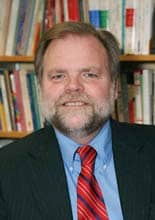Grace does not save "depraved" humanity but heals "good, but imperfect" humanity. Grace calls us to action, bringing forth our goodness and inviting us to be God's partners in healing the earth. Though the first Protestant Reformers scorned Pelagius due to their uncritical acceptance of Augustine's diatribes against the Celtic theologian, today's Reformers can learn much from Pelagius. In fact, we need both Augustine and Pelagius in the formation of a holistic faith: unstoppable grace comes to us, accepting and empowering us in all our brokenness; grace awakens our essential goodness and invites us to be partners in God's mission.
God's sovereignty does not depend on our passivity. Rather, our receptivity to grace leads to action and mission. The more complete our responses to grace, the greater works God and we can achieve in the world. God does not compete with us in power; rather God's power enhances our creativity, freedom, and power to change the world.
Solus Christus. Christ alone is the rock of our salvation, affirmed the Reformers. While some read this in terms of "no salvation outside the church" or outside a specific doctrinal affirmation of faith, I would suggest that "Christ alone" points to the interplay of universality and diversity in God's revelation. The healing and saving power in Christ is unrestricted by time and place. Grace is not grace if it is limited to adherence to a particular doctrinal understanding or religious tradition. Christ liberates us to seek truth and healing wherever they are found, whether in the laboratory, hospital, library, or other faith traditions. Christ opens the doors of revelation to all creation, giving hospitality and inspiration to God's beloved children everywhere.
Christ is alive, and moving within us to fulfill his healing, justice-seeking, and life-transforming mission in our time.
Soli Deo Gloria. God's glory alone is the center of our lives and all creation. God is the heart of reality, in whom we live and move and have our being. To affirm God's glory is to rejoice in the wonder of life and the beauty of our own lives. God's glory transforms and enlivens us, and opens us—with Isaiah—to discover that "the whole earth is filled with God's glory." A relational, non-competitive God, defined by grace and love, seeks our abundant life. As a wise church father proclaimed, the glory of God is a human being fully alive.
In light of God's glory, we can affirm "I thank you, God, for the wonder of my being." We can greet each day, grateful to God and ready for action, with the words, "This is the day that God has made. I will rejoice and be glad in it."
A God of grace and glory moves through every cell and every soul, enlivening, enlightening, and energizing. God's glory is in our salvation—our wholeness and healing—and in the transformation of this good earth so that it might reflect God's aim at beauty, truth, goodness, and justice. We give God glory by following the counsel of Mother Teresa, "to do something beautiful for God." We give glory to God by living in a sacramental way, seeing the whole world as filled with God's glory, and bringing forth God's glory by sharing in God's pathways of salvation for all creation.
Yes, as children of the Reformation, we are constantly reforming, living our faith anew, updating it constantly, dialoging with other traditions, and committing ourselves to a justice-seeking, world-affirming, beauty-creating faith.





